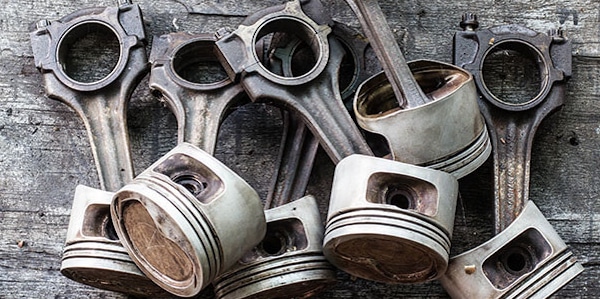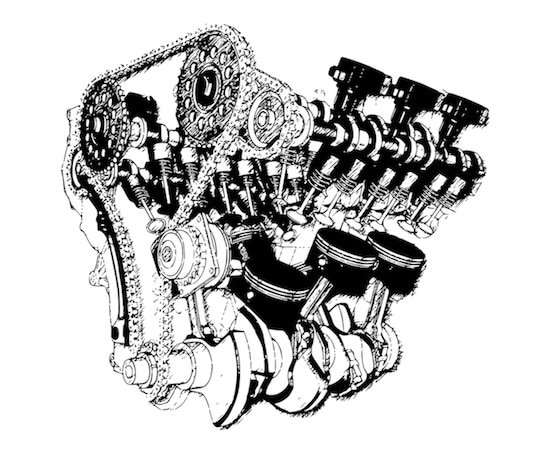What Is A Rod Knock? [5 Repairs Tips On How to Fix The Sound]
Many car owners do not listen to the engine noise until it is too late. Engines make a variety of sounds, and drivers should pay attention to these sounds to help them identify something amiss with their engine or car. Squealing brakes might mean you need your brakes looked at. A squealing sound when you accelerate could mean one of the belts is loose.
A knocking or tapping sound could mean you have rod knock, which is a severe issue and, if not looked at, and can cause serious damage to the engine. Typically this is caused by low oil pressure, so always pay attention to the check engine lights on your dash; however, once you hear the knocking sound or tapping, it is too late.
What is a rod knock?
Basic engine design incorporates a crankshaft that rotates inside your engine. The connecting rod is connected to the crankshaft and the piston. There are bearings at both ends of the connecting rod, engineered to very tight tolerances and lubricated with oil.
Age can cause these bearings to wear as well as low oil conditions. Low oil conditions can be caused by a loose oil cap, drained oil, and low oil pressure. Once the rod bearing surface begins to wear, usually from lack of oil lubrication, engine rod knocking sounds, or piston slap or both can occur.
Your engine will make a distinct sound of knocking and or slapping of the pistons. Even a thousandth of an inch difference can cause rod knock to occur and piston slap.
Is a rod knock the end of your engine?
 Caught early enough, an engine can be repaired. There is a significant expense involved since the engine must be removed from the vehicle, the head removed along with the oil pan. Usually, all bearings are replaced and perhaps the pistons as well if there is damage. New gaskets are needed, along with several other parts.
Caught early enough, an engine can be repaired. There is a significant expense involved since the engine must be removed from the vehicle, the head removed along with the oil pan. Usually, all bearings are replaced and perhaps the pistons as well if there is damage. New gaskets are needed, along with several other parts.
Some drivers will continue to drive their vehicles. There is a high risk of damaging the engine permanently. The bearings can heat up and seize, the connecting rods can break, or the pistons can break apart. Significant damage like this may require a brand new replacement engine.
How to fix a rod knock?
There are no additives or special oils that can fix a rod knock. The damage is already done. There are two ways to fix a rod knock. The first is to replace the engine completely. The second involves removing the engine from the vehicle, removing the oil pan, the cylinder head, and the connecting rods and bearings.
New bearings, possibly new rods, and pistons, along with new engine seals and gaskets as well as cylinder head bolts may be needed. The process can involve a large sum of money, depending on the engine. In some situations, where there is a lot of damage, mechanics might recommend the replacement of the crankshaft as well.
A rod knock sound coming from your engine indicates a severe problem with the engine. The mechanical failure can be caused by poor maintenance, i.e., not changing the oil or having sufficient oil in the engine or wear and tear on older engines. The following are few of the more popular FAQ’s many consumers have about rod knock:
Rod knock sounds can be caused by long term use of an engine, a manufacturing failure, but most often, it is oil starvation and overheating of the bearings.
The connection of the connecting rod to the crankshaft contains bearings that are engineered to a very tight tolerance. The bearings are bathed in engine oil, which keeps the bearings lubricated and running smoothly and avoids overheating.
Even slight wear and tear of these connecting rod bearings cause rod knock because the tolerances are outside design limits causing the connecting rods to knock as well as possible piston slap against the cylinder head.
Estimates to fix an engine with connecting rod knock varies by the type of engine, the make, and model. Also, the engine must be removed from the vehicle and dismantled. Gaskets, cylinder head bolts, pistons, bearings, and possibly even the crankshaft may need to be replaced.
Not every repair shop has the knowledge and expertise to complete this type of work for fixing a rod knock problem. You may want to get at least several estimates and references before making a decision.
Many people consider purchasing a different car instead of spending cash to repair the engine. Some drivers purchase a new or rehabilitated engine. Prices vary from $2,500 to $10,000 for a rod knock fix.
The answer is yes. You can drive a car with a rod knock. However, you really should not. Driving a car with a rod knock is inviting more serious damage to your engine and may increase the overall cost of repairs. The bearings may seize if there is insufficient oil from overheating and cause the connection rod to break inside the engine.
This can cause catastrophic damage to your engine, including blowing a hole through your engine block. Our suggestion is to have your car towed to a repair shop that is qualified to make these kinds of repairs.
If your car’s engine has been running smoothly and suddenly begins making a knocking sound, turn it off immediately. There may be insufficient oil in the engine, and this is one of the first things that should be checked. Drain the oil and add fresh oil to the required level and have your oil changed, including the oil filter.
Most engines take about five quarts of oil to fully replace it if you remove the oil completely. Low octane fuel can also cause this problem. Check your car’s instruction book to confirm the correct octane level of the fuel that should be used.
If the bearings are beginning to wear and tear, the knocking will become progressively worse, and none of these solutions can fix car engine rod knock. Avoid driving the car until arrangements can be made for repairs. Fixing rod knocks occur on a mechanic base or shop. Other sensor symptoms can show up when they run an OBDII scan.
F.A.Q

What causes a rod knock?
How much does it cost to fix a rod knock?
Can you drive a car with a rod knock?
Can an oil change stop engine knocking?
Tips for When You Hear Rod Knocking Sounds
We always recommend for you to replace the drained oil with a new synthetic option for better performance. Try to replace the oil and add a fuel injection cleaner in the gas tank to see if the sound goes away.
Rod knock, or piston slap is an indication of severe problems with the vehicle’s engine brought on by age, lack of oil, or problems with manufacturing. Driving the car with engine knock will only make the problem worse and could cause a catastrophic breakdown, including a thrown rod or tie rods.
These are serious issues that you cant allow zero gap tolerance an will need to try to fix the rod knock issues ASAP. Solutions include selling the vehicle, making repairs costing thousands of dollars, and replacing the entire engine.
Wrapping It Up
Note that selling the car will be difficult if you have a rod knock or bad engine. Only consumers able to make the repairs are going to be interested, and the car worth will be quite a bit less. Your car is going to be out of commission for some time if the rod knock problem persists.
Alternate arrangements must be made for transportation while it is in the shop. We recommend fixing the rod knock as soon as possible for your own safety. For more causes information and fixes follow our automotive engine blog. Now you know everything about a rod knock.
Last Updated on: February 21, 2024

